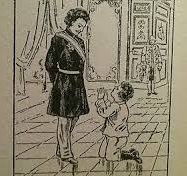Once a traveling peddler had told them that the letters on it meant Augustin Hirschvogel, and that Hirschvogel had been a great potter and painter. He said that Hirschvogel had made many such stoves, all wonders of beauty, putting all his heart and his soul and his faith into his work, and thinking but little of gold or praise.
有一次一個旅行小販告訴他們,上面的字是奧古斯汀·赫施沃格爾的意思,赫施沃格爾是一位偉大的陶藝家和畫家。他說,赫施沃格爾做過許多這樣的火爐,全都是美麗的奇跡,他把全部的心、靈魂和信仰都投入到他的工作中,卻很少想到金子或贊美。
So the stove had come to be called Hirschvogel. All the children loved the stove, but August loved it most of all. He used to say to himself, ‘When I am a man, I will make such things, too, and then I will set Hirschvogel in a beautiful room in a house that I will build.”
所以這個爐子就叫做赫施沃格爾。所有的孩子都喜歡爐子,但奧古斯特最喜歡它。他常對自己說:“等我長大了,我也要做這樣的東西,然后我要把赫施沃格爾安置在我要建造的房子里一個漂亮的房間里。”
August lay now in the warmth of the stove and told the children marvelous stories. In the midst of their chatter and laughter a blast of freezing air reached them even in the warmth of the old wolfskin and the great stove. The door had opened; it was their father who had come home. The father answered the welcome of his children very wearily, and sat down heavily.
奧古斯特此刻躺在溫暖的火爐里,給孩子們講著奇妙的故事。在他們的談話和笑聲中,一陣刺骨的寒風吹到了他們身上,即使是在老狼皮和大火爐的溫暖中。門開了;是他們的父親回來了。父親非常疲倦地回答孩子們的歡迎,沉重地坐了下來。
“Take the children to bed,” he said, and Dorothea obeyed. August stayed behind, curled up before the stove. Dorothea came down from putting the little ones into their beds, and then sat down to her spinning,
“帶孩子們去睡覺,”他說,多蘿西婭照做了。奧古斯特留在后面,蜷縮在火爐前。多蘿西婭把孩子們放到床上,然后坐下來紡紗。












